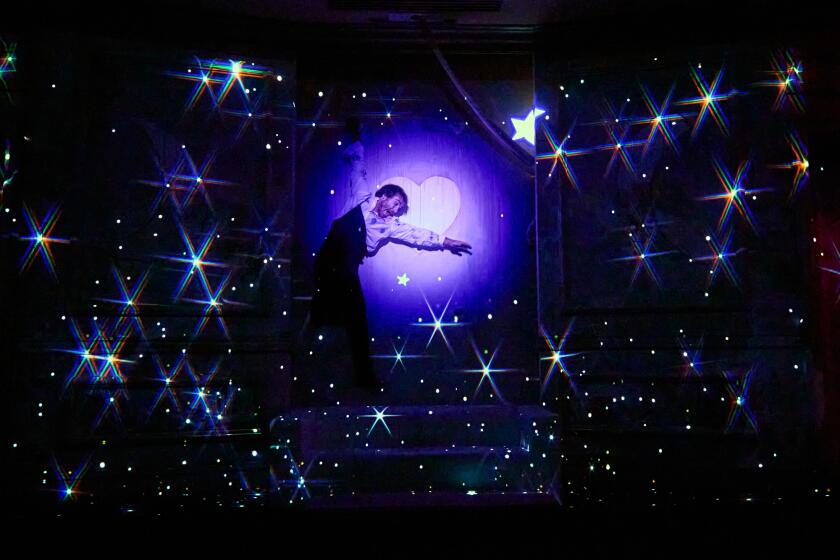In His Own Words : Actor’s Admiration for Martin Luther King Jr. Inspires Premiere of One-Man Show in Orange
The day Martin Luther King Jr. was assassinated in 1968, Roosevelt Blankenship Jr. was barely 9, a rural kid living in a backwater town deep in Alabama.
He was playing with brothers, sisters and other children when the wailing of adults broke through. Everyone gathered around their TVs to listen to the only station that broadcast into tiny Greenville. As the news became clear, Blankenship recalled, a sense of fatalism settled over the black neighborhood where he lived.
“It was like, first they got Kennedy, now they got Martin,” he sighed. “It was such a big blow to the community, this feeling that things were going to go back to the way they were.”
Blankenship said he was too young to fully understand the event, but as he grew older, he studied King’s life and work. His admiration for the civil-rights leader inspired “An Evening With Dr. Martin Luther King Jr.,” Blankenship’s one-man show that premieres at the Ensemble Theatre on Sunday afternoon.
Blankenship, who founded the Ensemble Theatre last year in the back of a mini-mall, said the play will last about an hour and cover King’s life from 1955 and events surrounding Rosa Parks and the Montgomery, Ala., bus boycott to the King-led “March on Washington” of 1963.
If the tribute goes well (meaning if the Ensemble is packed and the show appreciated), Blankenship said he’d dramatize the rest of King’s life, including his murder, in a performance “a month or two down the line.”
“An Evening With Dr. Martin Luther King Jr.” is based on King’s speeches, sermons and writings. Blankenship wrote connecting passages and will dress in costume, portraying King in various stages throughout the period, considered by many to be the most crucial years for the civil-rights movement.
“It was important for me to use his actual writings, mainly because I wanted a sense of realism,” Blankenship explained. “I go into (when he made) a stirring speech about the bus boycott (involving Parks) and when his house was bombed in Montgomery in 1956. The crowd was threatening to riot, but he quieted them.”
Other significant events include the days King spent in jail for his protests of racism and his reaction to George Wallace, then-governor of Alabama, and his attempt to bar integration at public schools. Blankenship also goes into King’s 1959 journey to India to study the passive resistance philosophy of Mahatma Gandhi, one of his role models.
Blankenship, 35, says he hopes the play will further bring into focus the man hailed by blacks and whites alike as one of the world’s most influential leaders, but who also was ridiculed by some black Americans for not taking a more aggressive, uncompromising approach.
“He was our greatest leader,” Blankenship said, “and when he died, much of the dream died with him. He was great because he was always trying to find a solution to the problems. He had this confidence that said he, and us, could accomplish anything once we put our minds to it.”
Blankenship, who has lived in Orange and worked in theater locally for several years, said it was an experience with his 6-year-old son, Roosevelt Blankenship III, that helped inspire him to create his Martin Luther King show. He recently asked the youngster what he knew about King and was disappointed by the answer.
“My son just didn’t know much about King’s history, what he meant to us,” Blankenship said. “I want to bring him back into the light, because children today need to know more about the movement. If kids today had him as a role model, I feel there wouldn’t be as much gang activity.” Accordingly, he said he feels his show about King is appropriate for all ages.
Blankenship also says that King’s desire for integration (in contrast to Malcolm X’s separatist’s position) is a powerful message for contemporary blacks. In contrast, Blankenship pointed to the Rev. Louis Farrakahn as a modern leader “with many good ideas about black pride” but also someone who preaches racial division.
“We do all have to get along, just like King said,” noted Blankenship. “Blacks and other minorities should not separate themselves or their businesses from the mainstream. To accomplish more, we have to mainstream.”
It’s a philosophy that reaches to the Ensemble Theatre. Blankenship, who directs many of its productions, said he prefers “high quality” dramas and comedies that reach a wide audience, regardless of race.
Although he staged Athol Fugard’s apartheid play “The Island” last year, he recently presented N. Richard Nash’s “The Rainmaker” and plans to offer David Mamet’s “Glengarry Glen Ross” next month.
“I’ve been asked why I don’t do more racially oriented plays, but I don’t feel I have an obligation to,” he said. “Some people might not like that about me. If the play is interesting and has a strong message to society as a whole, then I’ll do it.
“I don’t feel just because I’m black I have to reach out to a black audience. This play, for instance, is something that will reach all people, and that’s how I like it.”
* Roosevelt Blankenship Jr.’s “An Evening With Dr. Martin Luther King Jr.” plays Sunday at the Ensemble Theatre, 844 E. Lincoln Ave., Suite E., Orange. 4 p.m. $10. (714) 998-2199.
More to Read
The biggest entertainment stories
Get our big stories about Hollywood, film, television, music, arts, culture and more right in your inbox as soon as they publish.
You may occasionally receive promotional content from the Los Angeles Times.






